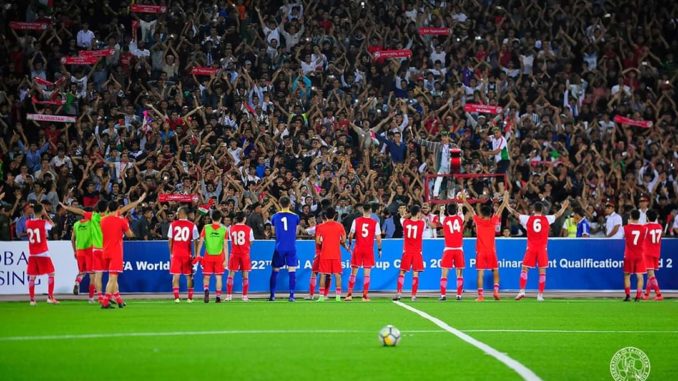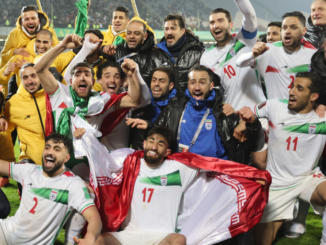
It would have surprised many to see Tajikistan atop their World Cup qualification group come the end of September, but what could initially be assumed as a one-off flash in the pan, instead has roots to be one of the more interesting underdog tales of this World Cup cycle.
Tajikistan, in a political sense, is regularly likened to North Korea. A closed dictatorship, that is propped up by an impoverished population, drained by an all consuming ruling family, a country well rehearsed in closing itself off from the rest of the world.
But while North Korea has looked to improve their footballing scene, in hope to project a better image of itself outside its borders, Tajikistan has largely forgotten about theirs.
The domestic game severely lacks funding, from basic infrastructure to playing facilities, Tajikistan’s top-tier league continues to shrink in number and shows little sign of shrugging off its corrupt past which stretches to regional associations across Central Asia.
The only case of governmental “assistance” comes in the form of leading club FC Istiklol, who have just romped home for a sixth domestic season in a row.
The president’s son Rustam Emomali instigated the formation of the club back in 2007, in which he featured as a player before moving on to own it entirely.
Istiklol are regularly criticised for having the governing body in its pocket, the main reason why their dominance has persisted for so long; acquiring their competitor’s very best Tajik talent in way of little to no compensation, whilst benefiting from, let’s just say, favourable refereeing decisions; in effect ruling the league redundant.
As has recently been the case, domestic interest instead lies continentally, or how the AFC Cup now works on a focused regional basis. As with Kyrgz champions Dordoi and Tukmen powerhouses Altyn Asyr, FC Istiklol represent the third jewel (outside Uzbekistan) in the Central Asian football armoury, reaching the final on two occasions in the last four years.

While success has on occasion arrived, consistency, as the others have also experienced, is difficult to rely upon when the rest of the league are playing catch-up.
While the domestic scene falters, the national team has ignited a bounce, through the appointment of proud and bullish Uzbek coach Usmon Toshev.
Far from being a household name, even back home in Uzbekistan, Toshev’s biggest achievements to date have come in Afghanistan prior to taking up the Tajikistan hot seat last year. What he lacks on his CV, he makes up entirely with his passion for the game and his unerring ability to prepare a team.
The starting theme under Toshev is clear, that of discipline. So much so that he used three different words for it in a recent interview (probably says a lot more about Uzbek culture in general) when talking up his impact since arriving.
He took over a team without heart, without backing and without direction, turning them full circle into a unit that is far greater than the sum of its parts. He’s conceded that his side lacks individual talent, instead focusing on occasions and emotion to make their mark.
And so they did, in their qualification opener at home to neighbours Kyrgyzstan. A mismatch of a contest with an added derby day feel, a capacity crowd roared on a team, previously lacking a clear idea, to an unlikely opening day victory. Something the fans could hold as their own, outside the control of their ruling overlords.
Toshev’s principles aren’t rocket science, but they’re proving successful. 1) Modernise an outdated structure, 2) curb external influence (banning outsiders from entering the dressing room on matchdays) and 3) trusting in your talent.
Alongside a slow rise in form at senior level, Tajikistan have seen an accelerated rise at youth level; finalists at the AFC U16s last year, while making it to the last eight on the last two occasions at U19 level.
Rather than being an exception, Tajikistan’s presence at the top end of Asian youth football is becoming the norm. The tougher task of course, is to replicate such form at senior level.

Tajikistan has never qualified for an AFC Asian Cup in their history, but general opinion genuinely believes this is the greatest opportunity yet to correct this.
Toshev has embraced the fresher growth of Tajik talent that has succeeded through the youth ranks, handing half a dozen debuts to players under 21 in the last six months, overseeing a squad that regularly averages under 25 years of age.
Half of the 23-man squad selected for September were under 21, with the majority of them already reaching double figures in caps.
This last week Tajikistan steamrolled the competition in qualification for next year’s U19s, with a number of seniors playing key roles. The style of play was consistent to that of Toshev’s team; quick, possession focused with an emphasis on getting it to their number nine, on this occasion 18-year-old colossus Shahrom Samiyev, who scored five goals over the three qualifying matches.
Their youthful base is well complemented by a spine of experience honed in Europe, mainly in Russia, encapsulated by the three Dzhalilov cousins. Defender Iskandar, midfielder Alisher and attacker Manuchekhr who all made decent fists of their time in Russia, but have gone up another level since returning home for both club and country.
Manuchekhr was the sensation of the last cycle, with his electric capability to stretch defences and score off barely nothing, his power and pace was a constant threat that even drew praise from visiting Australian journalists when the Asian champions rode into Dushanbe in 2015.
His younger cousin, Alisher, promises to have the same impact this cycle, after only being able to tie up his Tajik registration on the eve of qualification.
The classic number ten, he started with immediate effect, with a man of the match display to go with his match winning goal against Kyrgyzstan which immediately propelled him to national hero status. The former Rubin Kazan playmaker is agile, inventive but also industrious, and will prove to be a thorn in any defence’s side.
Tajikistan’s rise comes at a time when Central Asian football is starting to lurk out of its inward looking past.
Kyrgyzstan were one of the stand out performers at this year’s AFC Asian Cup, playing some of the most positive and tactically adept play the competition had to offer, while Turkmenistan has embarked on a root-and-branch reconstruction of their whole structure under new Croat leadership, already having tangible effects, in their narrow defeat to South Korea last month.
Tajikistan sit as the poorest relation in the region, with arguably the least amount of support from its FA. Yet, with an upsurge in talent making its way through and a bold, single minded coach at the helm, Tajikistan are out to provide yet more surprises as this World Cup qualification cycle rumbles on.
Photos: Tajikistan Football Federation




